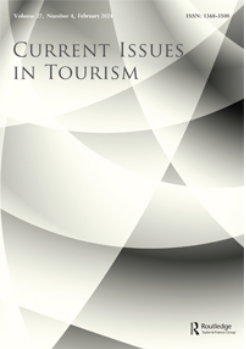旅游业带动增长的假说得到证实了吗?来自最新文献综述的证据
IF 4.6
3区 管理学
Q1 HOSPITALITY, LEISURE, SPORT & TOURISM
引用次数: 0
摘要
摘要:尽管旅游业主导增长假说(TLGH)的首次研究完成已有二十多年,但这一研究领域仍然出现在科学文献中,从经济角度对旅游业进行分析。在这方面,许多研究分析了旅游业与经济增长之间的关系,通常用游客到达、旅游收入和/或费用作为第一个方面,用国内生产总值作为第二个方面来衡量。基于95篇同行评议的文章,对2002-2013年期间的这些文章进行了第一次全面审查,其中评估了到那时为止获得的主要结果。在最初的回顾之后,学术文献对TLGH分析的兴趣非但没有减少,而且随着该领域大量文章的发表而继续存在。因此,在2014-2022年期间发表的82篇同行评议的实证文章被纳入本分析中,分析了更当前的情况,以及TLGH分析的趋势,确定基于结果、方法、测量变量或研究目的地的主要结论与前十年相比是否保持不变,或者在科学文献中是否发现了任何重大变化。关键词:旅游发展、经济增长、旅游主导增长假说、综合评价、格兰杰因果关系。本文的初步版本已于2023年4月20日在乌拉圭乌德拉尔举行的GAET旅游管理与经济研讨会上发表。披露声明作者未报告潜在的利益冲突。本文章由计算机程序翻译,如有差异,请以英文原文为准。
Has the tourism-led growth hypothesis been confirmed? Evidence from an updated literature review
ABSTRACTAlthough it has been more than two decades since the completion of the first study establishing the tourism-led growth hypothesis (TLGH), this area of research still appears within the scientific literature in its analysis of tourism from an economic standpoint. In this regard, numerous studies have analysed the relationship between tourism and economic growth, usually measured using the arrival of tourists, tourism income and/or expenses for the first dimension and with GDP for the second. A first comprehensive review of these articles for the period 2002–2013, based on 95 peer-reviewed articles, was carried out, in which the main results obtained up to that time were evaluated. After this initial review, the interest found in the academic literature in its analysis of TLGH, far from diminishing, has continued with the publication of numerous articles on this field. Accordingly, 82 peer-reviewed empirical articles published during the 2014–2022 period are included in this analysis on a more current situation, along with the trends in the analysis of TLGH, determining whether the main conclusions based on the results, methodologies, measured variables or the destinations under study have remained the same compared to the previous decade or if there are any significant changes found within the scientific literature.KEYWORDS: Tourism developmenteconomic growthtourism-led growth hypothesiscomprehensive reviewGranger causality AcknowledgmentsA preliminary version of this paper was presented at the GAET Seminar on Tourism Management and Economics (UDELAR, Uruguay), April 20, 2023.Disclosure statementNo potential conflict of interest was reported by the author(s).
求助全文
通过发布文献求助,成功后即可免费获取论文全文。
去求助
来源期刊

Current Issues in Tourism
HOSPITALITY, LEISURE, SPORT & TOURISM-
CiteScore
15.50
自引率
10.00%
发文量
230
期刊介绍:
Journal metrics are valuable for readers and authors in selecting a publication venue. However, it's crucial to understand that relying on any single metric provides only a partial perspective on a journal's quality and impact. Recognizing the limitations of each metric is essential, and they should never be considered in isolation. Instead, metrics should complement qualitative reviews, serving as a supportive tool rather than a replacement. This approach ensures a more comprehensive evaluation of a journal's overall quality and significance, as exemplified in Current Issues in Tourism.
 求助内容:
求助内容: 应助结果提醒方式:
应助结果提醒方式:


